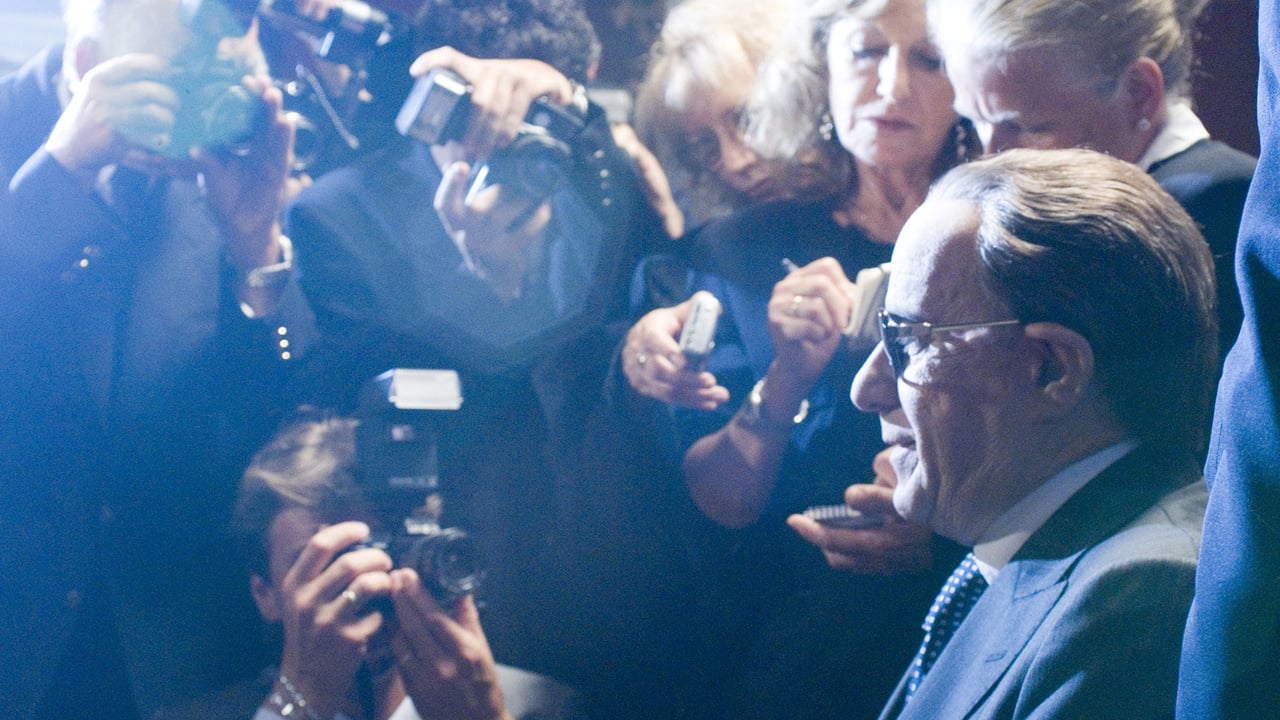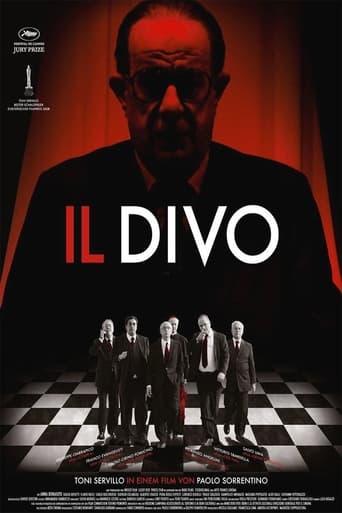ReaderKenka
Let's be realistic.
StyleSk8r
At first rather annoying in its heavy emphasis on reenactments, this movie ultimately proves fascinating, simply because the complicated, highly dramatic tale it tells still almost defies belief.
Adeel Hail
Unshakable, witty and deeply felt, the film will be paying emotional dividends for a long, long time.
Raven-1969
"True power does not need arrogance, a long beard and a barking voice," said Oriana Fallaci "true power strangles you with silk ribbons, charm and intelligence." So begins an enthralling, eclectic and dazzling portrait of one of modern Italy's most powerful, feared, wily and enigmatic politicians, Giulio Andreotti. This complex, practical and mysterious man was the leader and brains behind the Christian Democratic party, which had a virtual lock on power in Italy during the Cold War.This is no dull biopic. While focusing on the later part of Andreotti's reign, the film delves into the compelling personal world of a political mastermind, and a luminous dreamworld of mesmerizing scenes including assassins, bomb blasts, cars speeding through highway tunnels, a horse race, government agents with uzis, rainfall amid the ruins of ancient Rome, and more. "We learn from the gospel that when they asked Jesus what the truth was, he did not reply." Nor does Andreotti, and this is one of the keys to his power. This cryptic man was careful to avoid judgments and confrontations. He kept secrets to himself, even FROM himself, and revealed his hand only when necessary. Andreotti was an anomaly in an arena where things are usually done by shouting, throwing things and violent acts. With the wisdom, humor, mischievous nature, realism ("priests vote," said Andreotti about his frequent church attendance "God doesn't") there are many similarities to Lincoln. While the robotic and distant personality of Andreotti sets these leaders apart, the loneliness of both leaders is striking. According to Andreotti, he met over 300,000 people, but was nonetheless lonely. The film includes depth galore and from a variety of standpoints beyond the intellectual. There is depth even in the background. We hear it in a woman's sing-song voice on the television declaring "we won't be altered." This is the mantra of Andreotti and the CDP; anchors in a time of instability, violence and terrorism. The camera work and story line are close and personal. Through such devices we are drawn into the inner world of Andreotti. We walk with him as he emerges from an armored car and stops to look at anti-CDP graffiti. Startling contrasts of silence and sound, including whistles and blasting rock music, alter the mood and keep viewers on the edge of their seats. Toni Servillo brings impressive Daniel Day Lewis style focus and preparation to the role of Andreotti. The actor and director continued to do amazing things together including The Great Beauty in 2013. Here is a balanced view of Andreotti. His faults as well as his gifts are on display. "There are no angels or demons," said Andreotti "we are all average sinners." The setting of the film, Rome, is like a mirror of the film itself; mysterious, ominous, demons lurking in the shadows, factions, history and more. Jury Prize award winner at Cannes.
kosmasp
To make a movie about a politician is not the easiest task one can choose to make. But in this case, the movie does work exceptionally. We have a powerhouse performance by our main actor and even if you don't know the (real) man this is based on (I didn't), you will be able to follow the story quite easily.In its heart this is a drama in more than one sense of the word. Sometimes a man can change, sometimes he can. With politicians it's tough to know what you'll get, listening to the promises but maybe not being able to get all those things or maybe not willing. There is a lot at stake and maybe even "friends" that will either support one or not based on popularity. A tough subject as I already said ... but very nicely put together ...
nitznitch
I'll fully take the word of reviewer "Mario Pio" (older author of "The Story of Language" a classic book in it's field), in particular because I was very impressed by his IMDb review as "elvinjones" of Roman Polandki's Repulsion. Reviewer "Donna Augustini" saw right away the bold reference to the dramatic film of Greek politics, Z (He is alive). Other Italians saw how Sorrentini made a script and directed it as a way to say that ALL THOSE PARLIAMENTS Italy had in the 20thCentury were a script and direction by Mussolini-Andreotti-Burlesconi. Unified of Italy in 1860 Camillo Cavour also thought Nicolo Machiavelli was the greatest philosopher, later for his own purposes endorsing instead John Stuart Mill!Paolo Sorrentini was able to convey such a sweep of impressions in his own style by using printed words at the very beginning and at the end, that way making the back-and-forth of the narrative coherent. The pictures of the characters could be associated instantly with their fates.
MisterWhiplash
I'm sure if I were raised in Italy and paid attention to Italian politics day in and day out all of what transpires in Il Divo would be no less than engrossing. The story of Androetti, the head of a government that went for seven administrations and then went on to run for President has some really fascinating things to it. One of those is seeing just how the parliament works in those scenes midway through the picture and how the country actually chooses its president, which is so far removed from the US democratic process it's hard to fathom. And I also admired how the actor playing Androetti so got into this kind of quietly conniving politician, a man who believed that politics was everything and yet would never get passionate enough to raise his voice above a whisper. Somewhere inside of him a Dick Cheney is rumbling, perhaps.But the problem in watching the film if you don't pay attention to the Italian politics of the period, or just in general, is that the filmmakers lose you fairly quickly. I usually find myself a viewer who doesn't like to be spoon-fed information very simply, but this is on the opposite end of the cannon where only a few real details are clear enough and then the rest comes whizzing by at a quick clip (and quick indeed as the camera style is akin to the operatic nature of Scorsese, only not as talented or focused). Names of characters keep coming up as title cards, and except for a couple of names like "The Lemon" (Androetti's right-hand man), none of them really stick out, and the incidents keep piling up without any real connection. At some point the basic story does reveal itself and holds some interest, but there's a disconnect between many scenes too, and a sense of cross-cutting done a few times (i.e. the horse race scene crossed with a shooting) comes off as unimaginative.It's not a waste of time though if you're totally ignorant about Italy's political structure and brash sense of the power dynamic. But it's not one that I particularly enjoyed, either, and its lack of a connection with the mounting details made it harder to appreciate.

